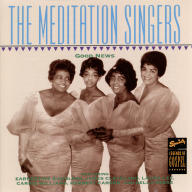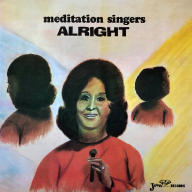As the Meditations' renown quickly spread, they began performing throughout the Midwest, and in early 1953 cut their first session at a local record store. Reese left the group to pursue pop success soon after, and was replaced by Lee, Rundless' teenage daughter; unbeknownst to the Meditations, their record was then licensed to the Deluxe label, and in short time they were signed to Specialty. By the time of their next session in the spring of 1954, their studio lineup also included co-lead Carrie Williams, tenor Herbert Carson, and pianist Emory Radford; Williams remained with the group only briefly before returning to Detroit to operate a beauty salon, while Carson later enlisted with the Herman Stevens Singers, among others. Poor sales prompted Specialty to drop the Meditations, who then spent the mid-'50s concentrating on the road; by the end of the decade, however, they were working regularly with the legendary James Cleveland, and his involvement led Specialty to offer a new contract.
The Meditations' third Specialty session followed in mid-1959; however, the label soon exited the gospel business altogether, and a fourth session never materialized. Instead, the group signed to the Hob label, recording once more with Cleveland before he left their ranks. Throughout the '60s, the Meditations appeared on a series of labels, among them SAR, Chess, Checker, Savoy, and Jewel; they also toured constantly, in 1962 becoming one of the first gospel acts ever to play Las Vegas when they backed Reese during a performance at the Flamingo Casino. Their performance there even caught the attention of Frank Sinatra, who singled out Lee's potential for pop stardom; she remained with the group until 1965, at which time she moved into secular soul music and later scored a hit with Women's Love Rights. The Meditations carried on in her absence, continuing to tour regularly until the early '80s. ~ Jason Ankeny, Rovi














